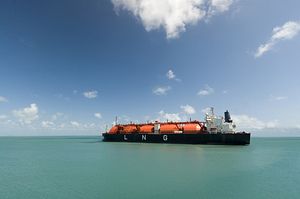This year is predicted to be a boom year for Papua New Guinea. The country’s economy is forecast to expand 15.5 percent, according to the government budget released in November. The Asian Development Bank forecasts that GDP growth will be 21 percent in 2015, up from 6 percent last year. As The Economist noted last month, Papua New Guinea is tipped to be the world’s top grower in 2015.
The reason for these hefty predictions is the country’s first full year of exporting liquefied natural gas to Asia. The $19 billion LNG plant, led by Exxon Mobil in PNG’s highlands, began production in April last year. Over its 30-year lifespan, the project will produce 6.9 million tons of LNG per year and will feed development in Asia – shipments will supply Japan, Taiwan and China. Two further gas projects currently being developed could further cement PNG as a key regional energy producer.
However, PNG’s bigger-than-Ben-Hur growth forecasts should be questioned, for several reasons.
Of most immediate concern are free falling global oil and gas prices that could see revenues from the LNG project evaporate. In a December policy paper, Paul Flanagan, a former advisor to the PNG government, said that “PNG must adjust to lower LNG/oil prices to avoid a crisis.” He argues that the 35 percent decrease in oil prices since the PNG 2015 budget was devised will decrease revenues by at least 10 percent and may see benefits of the project vanish for over a decade. This combined with poor fiscal, monetary and foreign exchange policies, Flanagan argues, will significantly diminish both short term and long term benefits of the LNG project. The government has ignored these fears with the finance minister saying it was too early for “a knee-jerk reaction.”
If the former treasury advisor’s concerns are accurate and oil and gas prices remain low PNG may see little growth. Indeed, 2015 may instead be marked by the culmination of the country’s “resource curse.” Regardless of revenues made from the country’s revenues, Papua New Guineans have witnessed the hype of the country’s resource boom and expect to see improvements in services and their own standard of living. These have been slow coming and many are becoming impatient. PNG lags at the bottom of key development indicators and made no progress in 2014, despite economic growth and significant aid, mainly from Australia.
PNG is Australia’s second biggest aid recipient, to the tune of half a billion dollars per year. Australian Foreign Minister Julie Bishop early last year noted that it is “distressing” that despite such investments PNG, in terms of commitment to the Millennium Development Goals, “is going backwards.” During the 23rd Australia-PNG Ministerial Forum, Bishop noted Canberra’s desire to “make sure that PNG has in place a sovereign wealth fund so that the money they are receiving from these massive energy projects can be spread throughout PNG.” She also announced plans to support gender equality (the prevalence of violence against women is likened to that seen in war-zones) and support the transformation of the public service.
Both the creation of a sovereign wealth fund and changes to public service sector should help deal with some of PNG’s more endemic problems. Allegations of government corruption have been of major concern. The prime minister will later this month face charges of misconduct in office. Similarly, the grace period for the prime minister against motions of no confidence ends in 2015 and thus could see him more vulnerable if things go awry.
All told, instead of 2015 being the much hyped bumper year for Papua New Guinea it may well be one that significantly tests the maturity of a more vulnerable government to make wise policy choices.

































